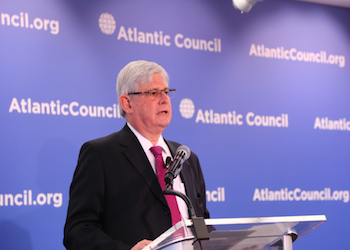Brazil’s chief prosecutor highlighted the importance of international cooperation in ongoing probes of the biggest corruption cases in the country’s history. But while multilateral exchanges of information and best practices have helped advance these investigations, they also may have some potential drawbacks.
Rodrigo Janot, Brazil’s prosecutor general overseeing the massive “Operation Car Wash” (Operação Lava Jato) and Odebrecht corruption cases, applauded collaboration between Brazilian authorities and international partners during a July 19 discussion at the Atlantic Council think tank in Washington, DC.
“Combating corruption is not simply a problem for Brazil, Argentina, and Venezuela. It’s a regional problem,” Janot said. “If crime [globalizes], prosecutorial bodies have to do the same … It’s because of [multilateral] cooperation that we’ve found perpetrators and assets regardless of borders.”
According to the prosecutor, between 2014 and 2017 Brazil has submitted 176 requests to 38 countries for mutual legal assistance in connection with the “Car Wash” investigation, which revealed that executives at the state-owned oil company Petrobras accepted bribes and kickbacks from Brazil’s construction conglomerates in exchange for granting them inflated public works contracts.
Janot also highlighted that the exchange of evidence, technology and investigative strategies between Brazilian and US prosecutors has proven integral to anti-corruption proceedings against the Odebrecht construction company, which pleaded guilty to bribery charges in December 2016. Multilateral cooperation on the Odebrecht investigation was the “first agreement” of its kind struck between Brazilian, US and Swiss officials, the prosecutor said.
While formal requests for mutual legal assistance are typically sent for approval by federal-level authorities, Janot called for more flexibility in transnational investigation proceedings.
“We have information that can be exchanged independently of formal investigation requests,” the prosecutor stated. “Still, it’s important that we maintain proper controls over the exchange of documents and evidence.”
Janot’s remarks come days after former president Luiz Inácio Lula da Silva was sentenced to nine years in prison for money laundering and bribery, and less than a month after Brazil’s current president Michel Temer was charged with passive corruption.
InSight Crime Analysis
Janot’s comments describe an important dynamic: As criminal networks have globalized, so have efforts to probe extensive corruption schemes involving suspects in numerous countries. In addition to the Odebrecht and Petrobras investigations, the still-unfolding probe into corruption in the global soccer regulatory body FIFA represents another example of the potential benefits of international cooperation in such efforts. These exchanges help authorities access both evidence that can aid in prosecutions as well as tactics and best practices for approaching corruption cases.
SEE MORE: Brazil News and Profiles
However, transnational collaboration can be a double-edged sword. Outside assistance, particularly from powerful countries like the United States, can potentially weaken incentives for countries with less-efficient legal systems to shore up their own ability to successfully carry out investigations and prosecutions. And some legal tactics adopted from abroad may be poorly-suited to different contexts. For example, Brazilian authorities have previously come under fire for their reliance on plea bargains, a tactic employed extensively by the US justice system in organized crime cases that has only recently been adopted in Brazil.

